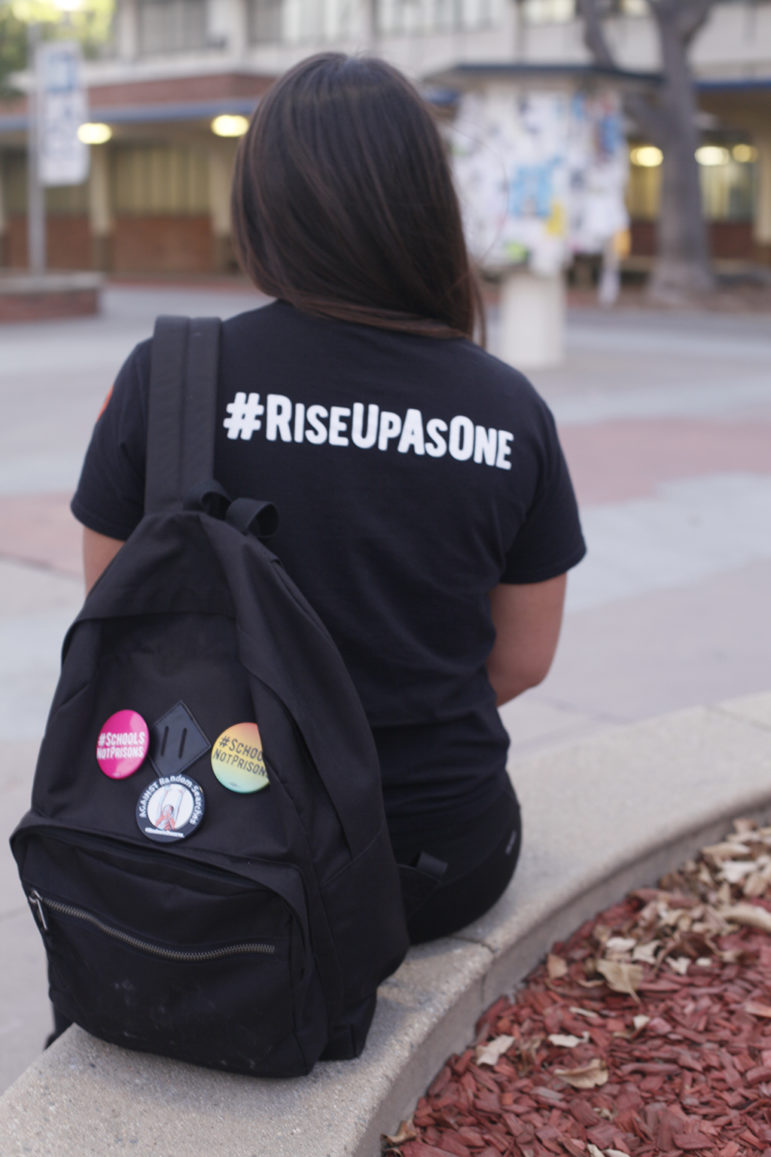
When I was 8 years old, my mom decided it was best for our family to move to this country: her, my two brothers and me. We left El Salvador when I was 10, and in doing so I parted ways with my whole family, including my oldest brother, my friends, my country and everything else that made me who I was.
When I first got to California, I went to an elementary school in Victorville where I would finish fourth grade. I found a teacher who had a particular interest in teaching me to speak English. She was a tall white woman, and although she didn’t speak Spanish at all, she found a way of getting me to stay with her during nutrition. In particular, she helped me pronounce words with cards that had figures in them like animals or simple objects which had their name on the bottom in black. She was like an angel in my life.
After about three months, I moved to Los Angeles. The schools there were very different. They were more crowded, unorganized, and the kids were rowdy. I was partnered with a girl in my class who who only ended up bullying me throughout fifth grade. It wasn’t only her; all of the kids there were mean. They would call me names and make fun of me for speaking differently.
There was a class for Spanish-speaking kids, and of course they placed me in it. They didn’t really ask me if I wanted to join, but that was the norm for ESL students. I didn’t like the class, they just gave us worksheets to fill in. Before I left Victorville, however, my mom bought me little notecards like the ones my teacher had shown me. I basically taught myself after school. Everyone learns in their own way and comes from different backgrounds, but even if there aren’t a great majority of staff interested in teaching kids English as a Second Language, the students should still be given the opportunity to have a say in how we want to learn.
One day I was sitting in the classroom reading Scholastic News when the teacher picked on me to read aloud. I was nervous about how I would sound, but as he kept encouraging me, I finally gave it a shot and realized it wasn’t so hard and that I didn’t sound so different. I just went on from there.
Although I was starting to pick up the language, it was different for my brother. Being a 15-year-old immigrant at the time, he had gotten kicked out of about three high schools in less than a year. He was also being bullied in his schools because he didn’t know how to speak English, as well as because of the way he looked and dressed. People here are very cruel when you’re new to the country. They think just because you aren’t like them you can’t defend yourself. For many youth arriving early in their lives to this country, speaking English aloud is the hardest, because they are scared of how they may sound or how others might look at them.
Anyway, everywhere we went we had to make sure it was safe enough for my brother because he was starting to get less involved with school and more involved with the streets. In 2012, my brother ended up behind bars. He was just 16. I was fortunate to have come to this country at the age of 10, but there are many youth like my brother who come at 15 or older. They should be given more opportunities to learn to speak English. The schools should show them more support because to some extent they are the ones responsible for creating a disorganized system that pushes them to look for “protection” somewhere else.
The charges against my brother were exhausting, and my mom and I weren’t familiar with the laws in this country. That’s when I began translating everything for my mom to understand what was happening with my brother’s case. I started missing a lot of school to attend every court hearing for my brother and to speak to his lawyer. To make matters worse, we ended up moving more than an hour away from the middle school I was attending, and I had to get up at 5 a.m. each day to make it to school on time.
High school was just around the corner, and I decided a smaller school would be the best option for me. My mom was supportive. With my brother’s case unresolved, I took it all with me to high school. In 2014, I started at a small high school in downtown Los Angeles that consisted of about 80 people who were predominantly Hispanic. Immediately I connected with the teachers and other students; I felt like I was a part of a community. However, this feeling didn’t last very long because after just one year the school was closed down. I didn’t have many options in my neighborhood, and I felt very scared for what was coming.
But I was in for a surprise. The staff managed to stick together and reopen under another name at the same location. There I met my history teacher, and we connected as soon as we met. Even though the school was having its struggles, my history class was an outlet for me to gain more understanding of what was going on around the world and in my community. Then, again, just as I was getting comfortable they ended up closing it due to lack of funds.
I had to start at a different high school one more time. Although this time is different. I have more knowledge and experience. I am ready for any challenge that gets in front of me, because I know I can get through it. If my time through the education system as an English Language Learner has shown me anything, it’s that we have 10 times more obstacles to go through in order to have a decent education. Some of us are able to get through them, but not all of us, and schools should provide more focused resources for ESL kids and listen to how we want to learn.
At the end of the day, all the sacrifices are worth it because I’m proof of the great things immigrants can bring to this country. Next year I’m off to college, and now that I have all of these experiences under my belt, I know that the future holds amazing opportunities for me to keep growing as an individual and to keep striving for change.
Kathy, 17, is graduating high school in June 2018. She is a youth activist on her way to college where she’ll continue fighting for the rights of her community.































